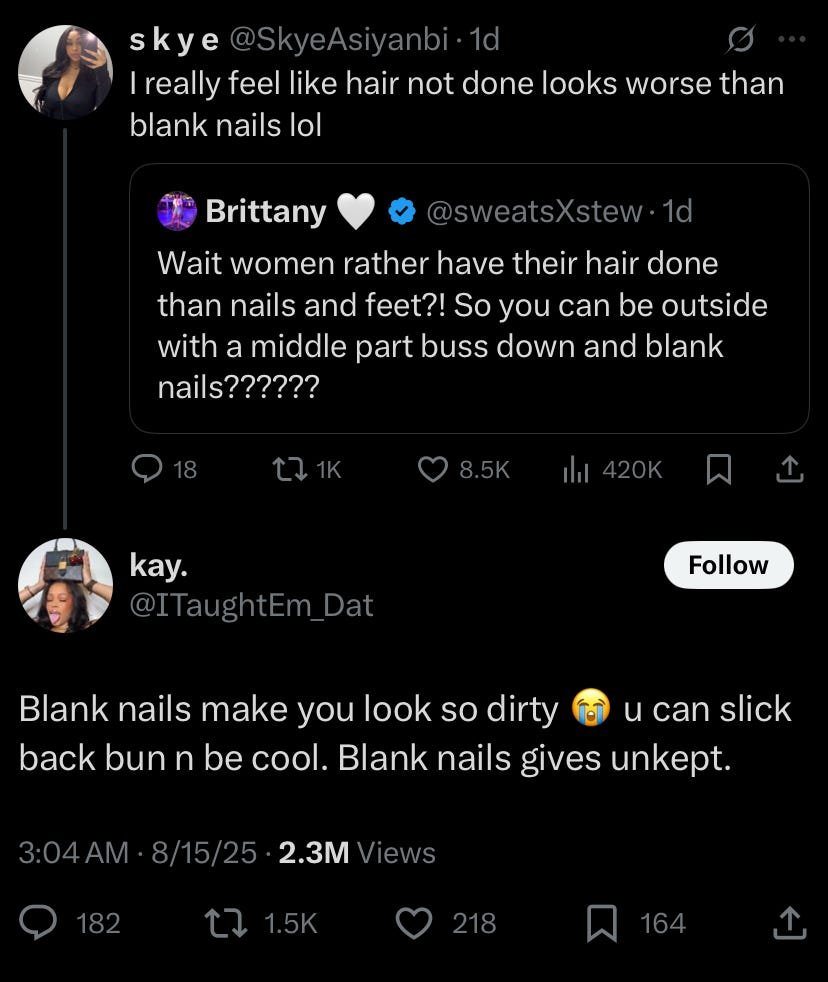Your natural nails make you look unkempt
— REPUBLISHED FROM Fọlá
PHOTOGRAPHY BY CHRIS ABATZIS
Imagine how surprised and angry I felt when I came across tweets implying that your “blank nails” make you look dirty and unkempt. I honestly could not believe my eyes.
Screenshot of post from X containing an interaction between X users @sweatsXstew, @SkyeAsiyanbi and @ITaughtEm_Dat
I am not even going to address how ridiculous it is to refer to one’s natural nails as blank nails because I would be giving validity to the phrase by doing that.
It is really unfortunate that women keep manufacturing new insecurities for themselves—all aimed at the performance of femininity—and it is painful to observe. The society is largely to blame.
The entire conversation, as shown in the screenshot above, rubbed me off the wrong way, especially because their definition of looking kempt/having a good appearance is wearing a wig or weave; and fixing acrylics or gels on your nails. Doing neither of them connotes untidiness.
It gets worse. 🤦🏾♀️
This twitter user believes that a “legit” reason must exist for women not to have their nails “done”. According to her, any woman who does not have her nails fixed must be in between appointments or have a job that prevents her from doing so.
But what if she doesn’t want to? Is there no option for women that just want to be or have no intention of putting themselves under the pressure of performing society’s definition of femininity?
Many women repeatedly express so much disdain for their bodies and natural features, and view them as inferior.
“Wearing your natural hair makes you look untidy”, “Keeping your armpits, legs and pubic hair unshaved is unhygienic”, “Get rid of your stretch marks”, and the new kid in the block?—“Wearing your natural nails make you look unkempt”.
I AM TIRED OF THESE STANDARDS AND I WANT TO SCREAM!!!
How did we get here?
It is a collection of factors including Objectification of women, Capitalism, Racism, Sexism, Colorism, Eurocentrism, Consumerism. It is a lot of isms.
When one exists in a society that deems their features inherently inferior and punishes them for wearing these features, it is not unlikely that they internalize this hatred, and alter these features to conform to societal beauty standards. For example, in many workplaces, if you do not wear braids or have a 30” bone straight wig on, no matter how tidy your natural hair looks, you are likely to receive obnoxious stares and weird questions asking why you look unwell. It is a sad mess.
Women have been reduced to their looks, and the validity of their beauty depends on how far they are willing to do a mating dance to attract men. This is objectification. It establishes the idea that a woman is defined by her body, and reduces her to a mere sexual object who is expected to perform for the male gaze. A woman is expected to focus on the aesthetics of her appearance, and compete with other women, just to gain acceptance in society. Not only is this unfair, this objectification is also responsible for the dehumanization of women, self-hate, body dysmorphia, and ultimately the normalization of violence against women, particularly sexual violence.
Capitalism perpetuates this objectification as it dictates that big corporations prey on our insecurities and create new ones to make profits. Through advertising and marketing, they promote an ideal beauty standard, feeding off our self-doubt and convincing us that we must look a certain way and buy products to “fix” our features—potentially leading to consumerism. Unfortunately, many of us have fallen for this propaganda.
These beauty standards and capitalist propaganda perpetuate race, class, and gender hierarchies. These standards are often political distractions—a “distract and conquer” tactic that has been employed as far back as the 19th century to reinforce gender stereotypes as a form of social control. Some historical examples to buttress my points:
The rise in the use of corsets in the Victorian era restricted women, promoting the idea that women are delicate and domestic figures who should not engage in physical labour.
During World War II, women saturated the work force after male soldiers went to war. Post war, a homemaker look was promoted by Western governments to encourage women to leave their jobs for returning male soldiers and return to domestic work.
In 1968, Vogue magazine spread propaganda that labeled cellulite as a flaw that needed to be fixed. (Mind you, 80-90% of women have cellulite connoting that it is a normal body feature.)
The ideal body type has shifted over time, from the thin and symmetrical face standard of the 1990s/early 2000s to the latest trend of hourglass figure and thin waists.
This tactic has not stopped. As gender equality progresses and women gain more political and economic power, beauty industries create new insecurities and beauty standards causing women to shift focus from promoting gender equality to “fixing” their appearances. A bad old tactic used by governments to maintain male dominance.
These are the reasons we are witnessing an increase in BBLs, cosmetic surgeries, liposuctions, rhinoplasties, bleaching, eating disorders, body hair removal, botox and fillers, hair extensions, permanent hair straightening and orthorexia. The divine femininity trend is also a result of this capitalist propaganda.
PHOTOGRAPHY BY CHRIS ABATZIS
“We are victims of a capitalist and consumer system created with the sole purpose of keeping us in that state of dissatisfaction and exploiting the insecurities caused by it, because—as many other great women said before me—if tomorrow all the women in the world looked in the mirror and liked themselves, many, many companies would go bankrupt. Because happy women are terrible consumers!”
Beauty is a social construct and it is very much political. Women should not have to perform beauty for anyone to take us seriously. Women should not have to perform femininity for men. This constant performance of femininity is a function of the gender binary that seeks to reinforce gender stereotypes and objectify women. We must all resist this.
The responsibility lies with all of us—especially society. We have become a society that shames women for looking normal—shames women for wearing their natural features, shames women for not being curvy, shames women for being fat, shames women for being skinny, shames women for being dark skinned, shames women for having stretch marks, shames women for having cellulite, shames women for undergoing surgical procedures to please society, dammit!! even shames women for not feeling shame. Of course women will internalize this shame. And of course, beauty industries leverage on this culture of shame to exploit insecurities, and even create new ones. They must crumble.
To women, please realize that the journey to getting rid of self-hate is self-acceptance. Please see yourself as a complete being with inherent value. Try not to lean into the lie that you have to look a certain way to be accepted. These corporations feed off our insecurities and if we collectively embrace these “insecurities”, and refuse to be shamed for them, it will be impossible for anyone to exploit us.
“we are not bodies, we are human beings.”
— Sara Melloti.




